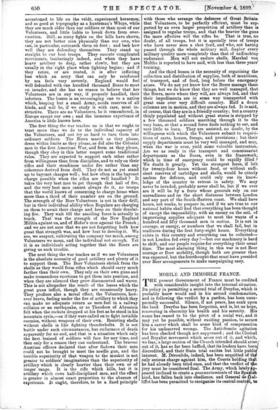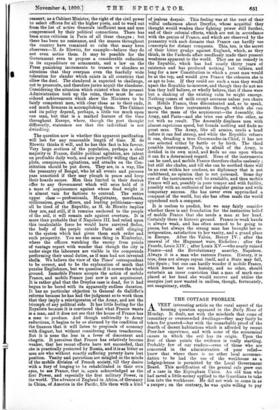MOBILE AND IMMOBILE FRANCE. T HE present. Government of France must
be credited with considerable insight into the internal situation. Its policy in permitting a second trial of Dreyfus, which it probably knew would end in his second condemnation, and in following the verdict by a pardon, has been unex- pectedly successful. Silence, if not peace, has sunk upon the land. Dreyfus has been forgotten, and is, let us hope, recovering in obscurity his health and his serenity. His name has ceased to be the pivot of a social war, and it may yet be possible, without exciting passion, to secure him a career which shall be some kind of compensation for his undeserved wrongs. The Anti-Semite agitation has been checked though not suppressed ; and the Clerical and Royalist movement which arose out of it, and which, we fear, a large section of the Church intended should arise ,- out of it, has so far been baffled, that its leaders have beeni discredited, and their State trial excites but little publi interest. M. Deroulede, indeed, has been acquitted of th only serious charge against him, the Courts holding th he had already been tried once, and that the verdict of jury must be considered final. The Army, which latelyi,tp- peared inclined to create a pronunciamiento of the Spa ish Spa kind, has fallen back into obedience, and General de al- liffet has been permitted to reorganise its central contra I, to
e
reassert, as a Cabinet Minister, the right of the civil power to select officers for all the higher posts, and to weed out from the list of active Generals inefficient men and men compromised by their political connections. There has been some criticism in Paris of all these changes ; but there has been no resistance, and the masses throughout the country have remained so calm that many keen observers—M. de Blowitz, for example—believe they do not even notice them. It may be possible for the Government even to propose a considerable reduction in its expenditure on armaments, and a law on the Press punishing incitements to treason or slanders so atrocious that they overpass even the fearfully wide toleration for slander which exists in all countries that allow the duel. The slandered is expected to challenge, not to prosecute, and therefore juries acquit the slanderer. Considering the situation which existed when the present Administration took up the reins, these must be con- sidered achievements which show the Ministers to be fairly competent men, with clear ideas as to their ends, and much firmness in accomplishing them. The Cabinet and its policy depend, perhaps, a little too much upon one man, but that is a marked feature of the time throughout Europe, where, though the poet thought differently, statesmen see that the individual is not dwindling.
The question now is whether this apparent pacification will last for any reasonable length of time. M. de Blowitz thinks it will, and he has this fact in his favour. Very large sections of the population, perhaps a clear majority in France, dislike political agitation, are intent on profitable daily work, and are perfectly willing that all plots, conspiracies, agitations, and attacks on the Con- stitution should be put down. They are, in a way, like the peasantry of Bengal, who let all events and persons pass unnoticed if they may plough in peace and keep their hoards secure. Men thus limited in their desires offer to any Government which will seize hold of it a mass of acquiescence against whose dead weight it is almost vain for factions to contend. The entire upper class — professionals, Magistrates, merchants, millionaires, great officers, and leading politicians—may all be tired of the Republic, as M. de Blowitz implies they are, and still, if it remains anchored to the people of the soil, it will remain safe against overturn. It is more than probable that if Napoleon III. had relied upon this incalculable force he would have survived Sedan, the body of the people outside Paris still clinging to the system which had given them such order and such prosperity. You see the same thing in Kimberley, where the officers watching the enemy from points of vantage report with wonder that though the city is under siege the labourers are visible in the compounds performing their usual duties, as if man had not invented shells. We believe the view of the Times' correspondent to be correct, and to be the explanation of much that puzzles Englishmen, but we question if it covers the whole ground. Immobile France accepts the action of mobile France, and mobile France just now is not acquiescent. It is rather glad that the Dreyfus case is dead, for it had begun to be bored with its apparently endless duration. It has no particular objection to General de Galliffet's reforms because he has had the judgment so to work them that they imply a reinvigoraton of the Army, and not the triumph of any political side. It has little feeling for the Royalists because it is convinced that what France wants is a man, and it does not see that the house of France has a man to produce. And though unfriendly to Army reductions, it begins to be so alarmed by the condition of the finances that it will listen to proposals of economy with disgust, but without considering them treacherous. But it is none the less in a fever of discontent and chagrin. It perceives that France has relatively become weaker, that her recent efforts have not succeeded, that she is practically protected by Russia, and it is as bitter as men are who without exactly suffering poverty have lost position. Vanity and patriotism are mingled in the minds of the mobile division of French society, till they desire with a fury of longing to be rehabilitated in their own eyes, to see France, that is, again acknowledged as the first Power, and especially the first military Power, in the world. The advance of England in Africa, of Germany in China, of America in the Pacific, fills them with a kind of jealous despair. This feeling was at the root of their wilful unfairness about Dreyfus, whose acquittal they thought would weaken their fighting power still further, and of their colonial efforts, which are not in accordance with the genius of France, and which are observed by the peasantry with such distaste that France can hardly use conscripts for distant conquests. This, too, is the secret of their bitter grudge against England, which, as they think, in the Fashoda affair needlessly made their present weakness apparent to the world. They see no remedy in the Republic, which has had nearly thirty years of existence and has produced nothing but talkers, and long for a new Constitution in which a great man would be at the top, and would give France the cohesion she is so apt to lose. If they could see such a man they would upset the Republic to-morrow, and though they do not see him they half believe, or wholly believe, that if there were but a shaking of the existing calm he might emerge. Nothing comes of milk except sourness unless you churn it. Mobile France, thus discontented and, so to speak, savage, has three instruments through which she can move the mass of the acquiescent—the Assembly, the Army, and Paris—and she tries one after the other, as yet with no result. The Assembly displaces men with almost capricious speed, but founds nothing and finds no great man. The Army, like all armies, needs a head before it can feel strong, and while the Republic refuses it one, dreading a true Commander-in-Chief, it has not one selected either by battle or by birth. The third possible instrument, Paris, is afraid of the Army, is divided in its own mind, and finds no one upon whom it can fix a, determined regard. None of the instruments can be used, and mobile France therefore chafes uselessly ; but still she chafes, and till she can be soothed there will be no rest within her confines, no diplomacy that is not embittered, no opinion that is not poisoned. Some day one of the instruments will be available, and then mobile France will act, possibly in pure temper and with futility, possibly with an outburst of her singular genius and with temporary success. She has never even approached a conquest of the world, but she has often made the world apprehend such a conquest.
It is useless to predict, but we may fairly consider whether there is any foundation for the instinctive belief of mobile France that she needs a man at her head. Certainly there is historic ground. France in weak bands is always weak, and has often seemed to be going to pieces, but always the strong man has brought her re- invigoration, satisfaction to her vanity, and a grand place in Europe. After the Valois, Henry IV. ; after the renewal of the Huguenot wars, Richelieu ; after the Fronde, Louis XIV. ; after Louis XV.—who nearly ruined France—and the Revolutionary anarchy, Napoleon. Always it is a man who restores France. History, it is true, does not always repeat itself, and a State may fall, like Spain ; but one can hardly wonder if mobile France, which knows her own history, and no other, should entertain an inner conviction that a man of mark once placed at her head she would recover and utilise the energies just now wasted in endless, though, fortunately, not sanguinary, strife.























































 Previous page
Previous page